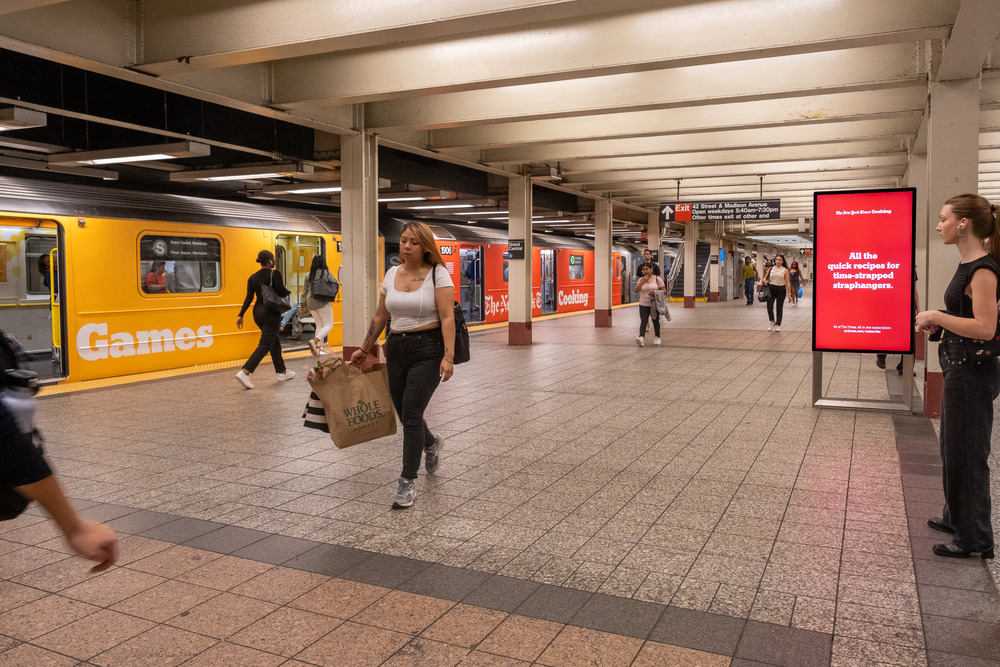Last month, the Broadsign team attended the 2024 OOH Media Conference, a three-day out-of-home (OOH) industry event hosted by the Out-of-Home Advertising Association of America (OAAA) that brought together over 1,000 brand marketers, agency leaders, and technology partners from around the world.
The theme of this year’s conference was ‘Our Moment,’ a nod to the technology advancements, creative innovations, and collaboration that have contributed to the resilience and adaptability of the medium. And what a moment to shine it is! From the revival of major U.S. cities post-pandemic to the emergence of AI tools and robust measurement capabilities, OOH is the fastest-growing traditional advertising channel, experiencing double-digit growth in 2023.
Read on for our takeaways from this year’s event
Digital OOH continues to drive action and remains a highly effective medium
Officially released during the conference, the latest study by the OAAA and The Harris Poll presented key findings around the efficacy of digital OOH (DOOH), particularly its ability to engage with audiences in a positive way. Results found that 73% of consumers view DOOH ads favourably, significantly higher than other media channels like TV/video, social media, and online ads. Millennial and Gen Z audiences favoured DOOH ads the most, an encouraging sign for advertisers as this group holds significant spending power.
Results also found that DOOH is more likely to drive action than any other competing media, with nearly 50% of consumers stating that DOOH ads are likely to make them take action post-exposure. Common types of action reported include watching video programming (38%), visiting a restaurant (30%), engaging in word-of-mouth conversations (29%), and store visitation (29%).
It’s clear that OOH advertising deserves a significant piece of the media pie. More advertisers and brand marketers are recognizing the unique benefits of DOOH and are increasingly reallocating dollars from digital channels into the medium. This shift not only drives top-level brand awareness but also prompts direct consumer actions in a favourable way.
The future of OOH goes beyond billboards
As the OOH landscape evolves, the medium is extending far beyond traditional billboards. The expansion into diverse formats, including transit advertising, is redefining how advertisers reach audiences while reshaping urban experiences. Brands can now appear in contextually relevant ways that grab consumer attention. The Harris Poll found that consumers consider dynamic ads with deals and offers related to things like weather conditions and timely discounts to be the most useful. From dynamic displays on buses and trains to interactive screens in subway stations and airports, OOH is harnessing new technologies and locations to capture consumer attention in increasingly effective ways.
We were excited to see that many of this year’s OBIE Awards winners went beyond billboards to include non-traditional formats – we’re talking train takeovers, airport installations, and even giant vending machines (yes, really). We’re looking forward to seeing how more versatility in OOH formats helps brands connect with modern consumers.

Physical ads amplify digital channels
Social Media and the Creator Economy
Social media remains a key focus in an omnichannel advertising strategy, particularly when it comes to reaching younger audiences like Gen Z. As influencers and content creators leverage their following to engage audiences across digital platforms, OOH offers a tangible extension of this engagement into the physical world and is now starting to play a significant role in the creator/influencer economy.
From smaller influencers to global superstars, many content creators are turning to OOH to promote brands, entertainment releases, and more. Brands and advertisers are also working with influencers to promote their offerings, leveraging consumers’ favorability toward influencers. In a 2023 study from the OAAA and Morning Consult, 31% of adults were found more likely to purchase a product or service with a familiar influencer, creator, or celebrity in an OOH ad. When brands and creators harness the power of OOH together, they can craft a powerful message that builds trust.
Connected Television (CTV)
As Anna Bager, President & CEO of the OAAA, said in her 2024 State of the OOH Industry speech, now is the time to show brands how OOH can help amplify their CTV messaging as consumers leave their homes. As OOH measurement and attribution capabilities become more robust and audience data gets more granular, the pairing of the two mediums is enabling more precisely targeted real-world ad delivery.
Together, OOH and CTV are creating a powerful combination for reaching modern consumers. By integrating OOH’s broad reach and high visibility with CTV’s targeted and interactive nature, brands can craft cohesive campaigns that engage audiences across multiple touchpoints. To strengthen a brand’s connection, marketers can engage consumers through CTV when they’re indoors and then reinforce the message with OOH advertising as they go about their day.
Artificial intelligence is here – and here to stay
Of course, a conference full of marketers wouldn’t be complete without a discussion (or many discussions) on artificial intelligence. Across the industry, marketers are leveraging AI tools to improve efficiency, enhance creativity, optimize measurement, and more. According to a recent OAAA member poll, over 50% of marketers now use AI in some form.
From OOH ad creatives to localization, AI’s applications in the OOH workflow are extensive, with tools that enable marketers to craft highly personalized and effective campaigns, streamline their processes, and gain deeper insights into their audience’s behaviour. And in this new era, staying ahead means not just adopting AI, but mastering its use to drive growth and innovation. While AI likely won’t replace marketers’ jobs, the general consensus is that marketers who understand how to harness these tools will thrive.
As we continue to grow and thrive as an industry, we’re looking forward to capturing a larger share of ad spend, especially thanks to automation and programmatic developments that are levelling the playing field with other media channels. We’re excited to see how OOH trends evolve over the next year.








